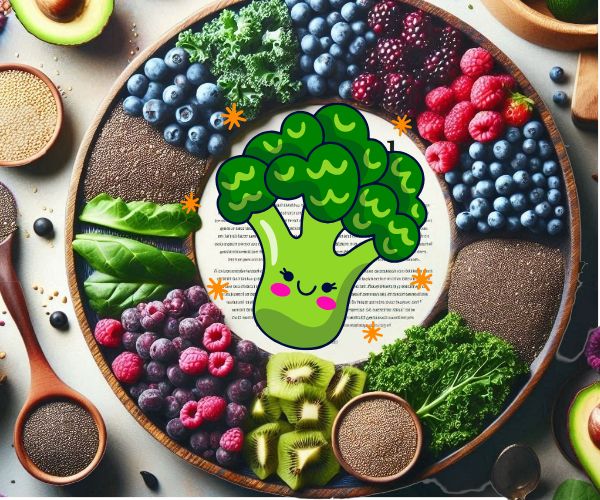Superfoods and Their Benefits : In the pursuit of optimal health, incorporating superfoods into your diet can be a game-changer, so will check out superfoods and their benefits. Superfoods are foods high in nutrients and loaded with health advantages. They are abundant in vital nutrients that promote general health, such as vitamins, minerals, antioxidants, and other micronutrients. These are typically whole, unprocessed foods that have been part of traditional diets for centuries. Common superfoods include fruits, vegetables, nuts, seeds, and certain types of fish. This article provides a detailed list of some of the most popular superfoods and their impressive health benefits.
Table of Contents

List of 10-Superfoods and Their Benefits
1. Blueberries
Nutrient Powerhouse
Blueberries are often hailed as one of the top superfoods due to their high antioxidant content. They are high in fiber, manganese, and the vitamins C and K.
Health Benefits
- Antioxidant Protection: Blueberries are loaded with antioxidants like anthocyanins, which help protect the body from oxidative stress and inflammation.
- Cognitive Function: Regular consumption of blueberries has been linked to improved brain health and cognitive function.
- Heart Health: These tiny berries can help lower blood pressure and reduce the risk of heart disease.
2. Kale
Nutrient-Dense Leafy Green
Kale is a cruciferous vegetable packed with vitamins A, K, C, and B6, as well as calcium, potassium, and magnesium.
Health Benefits
- Bone Health: The high vitamin K content in kale supports bone health and helps prevent osteoporosis.
- Detoxification: Kale contains compounds that aid in the body’s natural detoxification processes.
- Anti-Inflammatory: Its anti-inflammatory qualities may aid in the body’s reduction of inflammation.
3. Salmon
Omega-3 Rich Fish
Salmon is an excellent source of high-quality protein and omega-3 fatty acids, specifically EPA and DHA.
Health Benefits
- Heart Health: Omega-3 fatty acids in salmon can lower the risk of heart disease by reducing inflammation and improving cholesterol levels.
- Brain Health: These fatty acids are crucial for brain health and can help reduce the risk of cognitive decline.
- Joint Health: Omega-3s also support joint health and can reduce symptoms of arthritis.
4. Quinoa
Gluten-Free Whole Grain
Quinoa is a grain that is high in protein and free of gluten. It is a comprehensive source of protein since it includes all nine essential amino acids.
Health Benefits
- Digestive Health: Quinoa is high in fiber, which promotes healthy digestion and prevents constipation.
- Blood Sugar Control: Its low glycemic index helps in regulating blood sugar levels.
- Weight Management: The protein and fiber content in quinoa can help with satiety and weight management.
5. Chia Seeds
Tiny Nutritional Powerhouses
Omega-3 fatty acids, fiber, protein, calcium, and magnesium are all abundant in chia seeds.
Health Benefits
- Digestive Health: Chia seeds’ high fiber content promotes regular bowel movements and helps with digestion.
- Energy Boost: Chia seeds provide a steady release of energy, making them a great addition to breakfast or pre-workout meals.
- Heart Health: Omega-3 fatty acids in chia seeds support heart health by reducing inflammation and improving cholesterol levels.
6. Avocado
Nutrient-Rich Fruit
Avocado is rich in healthy fats, particularly monounsaturated fats, as well as fiber, vitamins E, K, B6, and C, and potassium.
Health Benefits
- Cardiovascular Health: Avocados’ monounsaturated fats can help lower harmful cholesterol and lower the risk of heart disease.
- Nutrient Absorption: Avocado enhances the absorption of fat-soluble vitamins (A, D, E, and K) from other foods.
- Skin Health: The healthy fats and antioxidants in avocado support healthy skin by keeping it moisturized and reducing inflammation.
7. Turmeric
Spice with Medicinal Properties
Curcumin, a substance with potent anti-inflammatory and antioxidant qualities, is found in turmeric.
Health Benefits
- Anti-Inflammatory: Curcumin in turmeric helps reduce inflammation and can alleviate symptoms of inflammatory conditions like arthritis.
- Antioxidant Protection: Turmeric’s antioxidants protect the body from oxidative damage and support overall health.
- Brain Health: Curcumin may improve brain function and lower the risk of neurodegenerative diseases.
8. Almonds
Nutritious Nuts
Almonds are rich in healthy fats, protein, fiber, vitamin E, magnesium, and calcium.
Health Benefits
- Heart Health:Eating almonds helps cut bad cholesterol and lower the chance of developing heart disease.
- Weight Management: The protein and fiber in almonds can help control appetite and support weight loss.
- Skin Health: By shielding the skin from oxidative damage, vitamin E from almonds supports healthy skin.
9. Sweet Potatoes
Vitamin-Rich Root Vegetable
Sweet potatoes are high in beta-carotene, vitamins C and B6, potassium, and fiber.
Health Benefits
- Eye Health: The beta-carotene in sweet potatoes supports eye health and may reduce the risk of age-related macular degeneration.
- Immune Support: Vitamins A and C boost the immune system and promote overall health.
- Digestive Health: Sweet potatoes’ high fiber content promotes a healthy gut and facilitates digestion.
10. Greek Yogurt
Protein-Packed Dairy
Greek yogurt is rich in protein, calcium, probiotics, and vitamin B12.
Health Benefits
- Digestive Health: The probiotics in Greek yogurt support a healthy gut microbiome and improve digestion.
- Bone Health: High calcium content in Greek yogurt helps maintain strong bones and teeth.
- Muscle Recovery: Protein in Greek yogurt aids in muscle recovery and growth, making it a great post-workout snack.
Conclusion
After reading the article “Superfoods and their benefits”, Including superfoods in your diet can improve your general health and wellbeing considerably. These nutrient-dense foods provide a wide range of vitamins, minerals, antioxidants, and other essential nutrients that support various bodily functions. By making superfoods a regular part of your diet, you can enjoy their numerous health benefits and promote a healthier, more vibrant life.
Disclaimer: Consult with a healthcare professional before making significant dietary changes or starting any new health regimen. 🌿🌟
FAQ
What qualifies as a superfood?
While there’s no strict scientific definition, superfoods are nutrient powerhouses. They provide large quantities of antioxidants, vitamins, minerals, and phytochemicals
Why are superfoods beneficial for health?
Superfoods offer a range of health benefits due to their nutrient density. They can support immune function, reduce inflammation, improve heart health, and enhance overall well-being.
What are some common examples of superfoods?
Berries: Packed with fiber, vitamins, and antioxidants, berries (strawberries, raspberries, blackberries, cranberries, and goji berries) improve immune system function and digestion.
Citrus Fruits (Oranges, Lemons, Grapefruits): High in vitamin C and flavonoids for immune support.
Leafy Greens (Kale, Spinach, Swiss Chard): Dense in vitamins, minerals, and antioxidants; may support healthy cognitive function.
Cruciferous Vegetables (Broccoli, Brussels Sprouts, Cabbage): Contain cancer-fighting compounds and fiber.
Chlorella: Rich in folate, iron, and vitamins; may promote healthy cholesterol levels.
How can I incorporate superfoods into my diet?
Here are some ideas:Add berries to smoothies or oatmeal.
Enjoy citrus fruits as snacks or in salads.
Include leafy greens in salads, stir-fries, or green juices.
Mix chlorella or spirulina powder into your morning drink.
Are superfoods a cure-all?
No, superfoods complement a balanced diet. Adding them to an otherwise unhealthy diet won’t offer full protection. Focus on overall dietary patterns and lifestyle choices.

